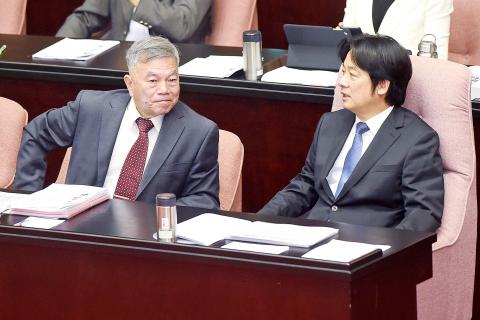Government measures to step up scrutiny of wire transfers to and from China are aimed at deterring money laundering and are non-partisan, Premier William Lai (賴清德) said yesterday, dismissing allegations that they are meant to limit donations to pan-blue candidates in the elections next month.
The Chinese-language China Times yesterday reported that the government has ordered state-run banks to strictly review wire transfers by Taiwanese businesses to and from China and to only process those that have invoices.
The policy is disguised as an effort to deter money laundering, but is really aimed at discouraging Taiwanese businesspeople in China from making cash donations to pan-blue candidates, the report said.

Photo: Huang Yao-cheng, Taipei Times
The policy does not apply to wires to and from other nations, it added.
The Chinese Nationalist Party (KMT) legislative caucus held a news conference decrying the policy, accusing the Democratic Progressive Party (DPP) of establishing a financial “Dong Chang” (東廠) — a Ming Dynasty secret police and spy agency.
Lai rejected the allegations at a question-and-answer session at the Legislative Yuan.
It is wrong to use divide and conquer tactics to project an image that the government is trying to curb capital inflows from Taiwanese businesses in China, as government efforts to crack down on money laundering are nonpartisan, the premier said.
The government welcomes investment by Taiwanese businesses based overseas and is drawing up policies to boost this type of investment, he said.
Taiwan is fulfilling its duty as a member of the international community by cracking down on money laundering, which helps to counter terrorism, human trafficking and the sale of controlled substances, he said.
Dismissing the report as exaggerated, Mainland Affairs Council Minister Chen Ming-tung (陳明通) said that it is only natural for the government to enforce rules under the Money Laundering Control Act (洗錢防制法), which are not directed at any political parties.

LONG FLIGHT: The jets would be flown by US pilots, with Taiwanese copilots in the two-seat F-16D variant to help familiarize them with the aircraft, the source said The US is expected to fly 10 Lockheed Martin F-16C/D Block 70/72 jets to Taiwan over the coming months to fulfill a long-awaited order of 66 aircraft, a defense official said yesterday. Word that the first batch of the jets would be delivered soon was welcome news to Taiwan, which has become concerned about delays in the delivery of US arms amid rising military tensions with China. Speaking on condition of anonymity, the official said the initial tranche of the nation’s F-16s are rolling off assembly lines in the US and would be flown under their own power to Taiwan by way

OBJECTS AT SEA: Satellites with synthetic-aperture radar could aid in the detection of small Chinese boats attempting to illegally enter Taiwan, the space agency head said Taiwan aims to send the nation’s first low Earth orbit (LEO) satellite into space in 2027, while the first Formosat-8 and Formosat-9 spacecraft are to be launched in October and 2028 respectively, the National Science and Technology Council said yesterday. The council laid out its space development plan in a report reviewed by members of the legislature’s Education and Culture Committee. Six LEO satellites would be produced in the initial phase, with the first one, the B5G-1A, scheduled to be launched in 2027, the council said in the report. Regarding the second satellite, the B5G-1B, the government plans to work with private contractors

‘NARWHAL’: The indigenous submarine completed its harbor acceptance test recently and is now under heavy guard as it undergoes tests in open waters, a source said The Hai Kun (海鯤), the nation’s first indigenous defense submarine, yesterday began sea trials, sailing out of the Port of Kaohsiung, a military source said. Also known as the “Narwhal,” the vessel departed from CSBC Corp, Taiwan’s (台灣國際造船) shipyard at about 8am, where it had been docked. More than 10 technicians and military personnel were on deck, with several others standing atop the sail. After recently completing its harbor acceptance test, the vessel has started a series of sea-based trials, including tests of its propulsion and navigational systems, while partially surfaced, the source said. The Hai Kun underwent tests in the port from

MISSION: The Indo-Pacific region is ‘the priority theater,’ where the task of deterrence extends across the entire region, including Taiwan, the US Pacific Fleet commander said The US Navy’s “mission of deterrence” in the Indo-Pacific theater applies to Taiwan, Pacific Fleet Commander Admiral Stephen Koehler told the South China Sea Conference on Tuesday. The conference, organized by the Center for Strategic and International Studies (CSIS), is an international platform for senior officials and experts from countries with security interests in the region. “The Pacific Fleet’s mission is to deter aggression across the Western Pacific, together with our allies and partners, and to prevail in combat if necessary, Koehler said in the event’s keynote speech. “That mission of deterrence applies regionwide — including the South China Sea and Taiwan,” he